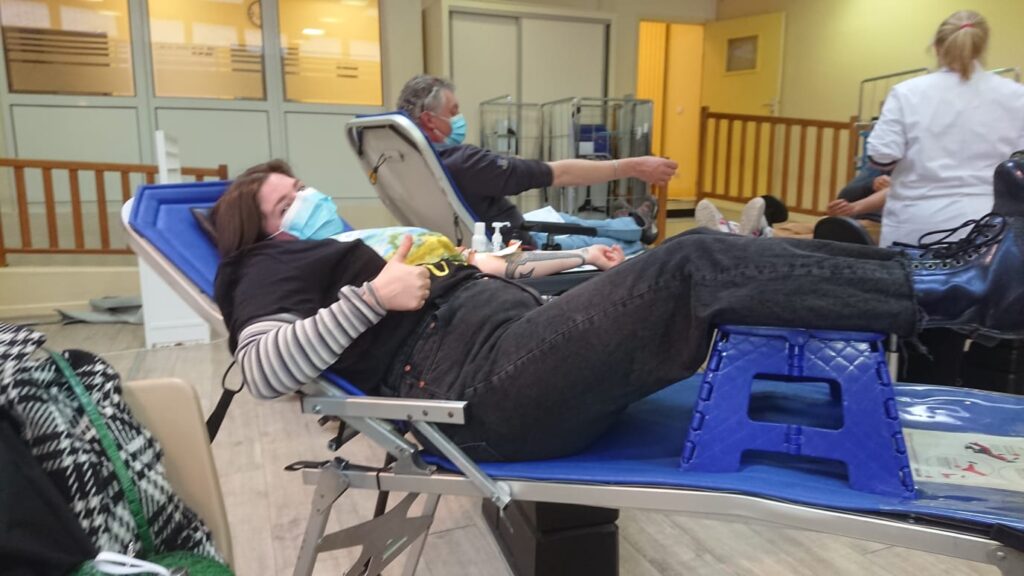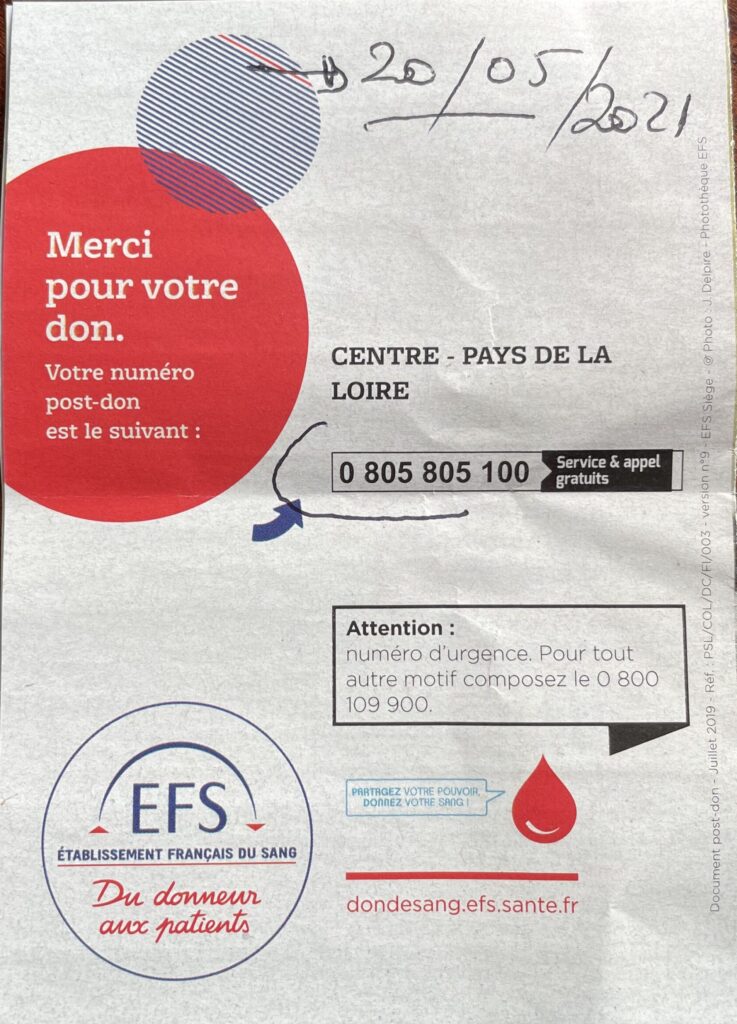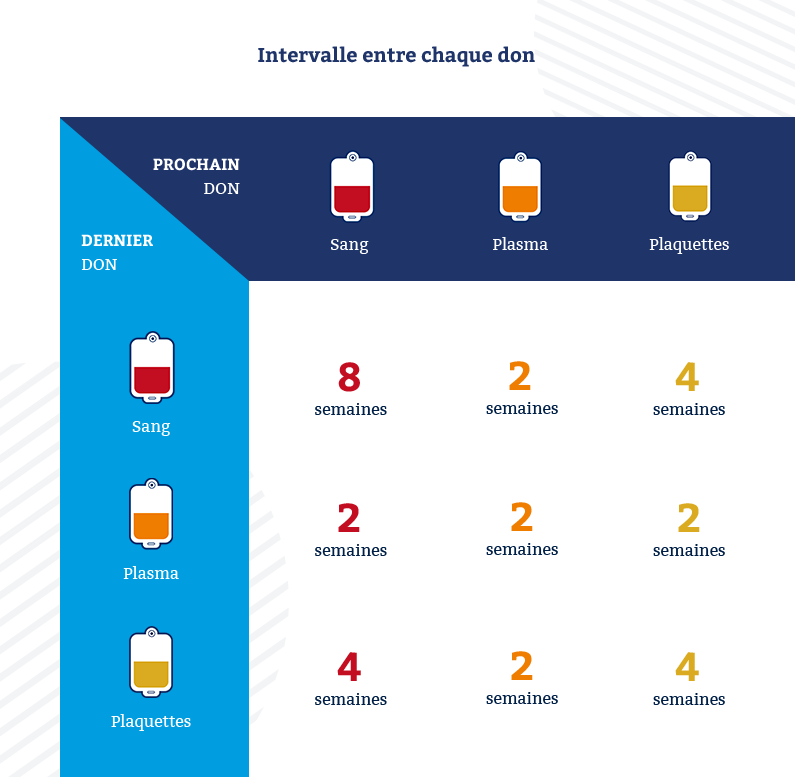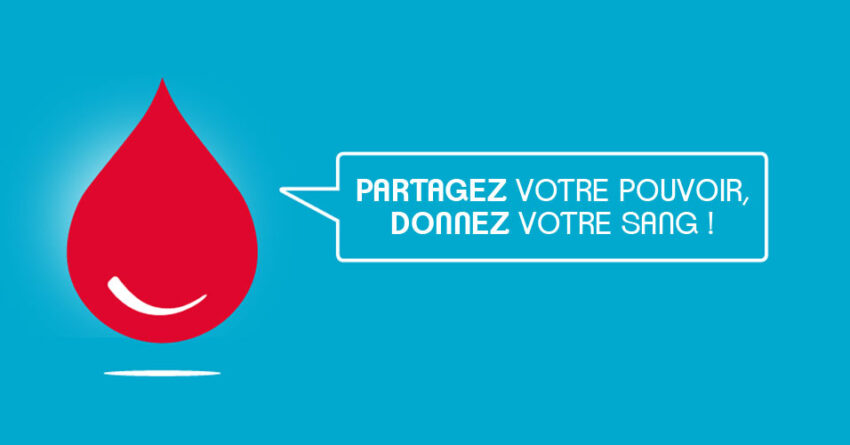Today I wanted to talk about donating blood in France. Pandemic aside, treatments for new and pre-existing illnesses still take place every day and donating is as important as ever. This article focuses on my experience donating blood in France (in the blue boxes) and how you can go about doing so yourself.
1 Hour Can Save 3 Lives
In France, blood donation is run by the Établissement Français du Sang (EFS). One of their slogans is: “one hour can save 3 lives,” and it could not be any more true! It takes about 1 hour to donate blood and the blood that is collected is separated into three main products. These three products (red blood cells, platelets and plasma) will be administered to three different patients. Thus, you help to save 3 different lives!
Why Donating is Important
According to the EFS, 10,000 blood donations are required every day to maintain yearly treatment of one million patients, and the demand keeps increasing. Of these patients, 47% transfused have cancer or a blood disorder; 35% of transfusions are performed during surgery; 32% of transfusions are for relative emergencies and 12% are for life-threatening emergencies.
Levels of blood reserves are visible on the EFS site and are evaluated over a period of 2 to 4 weeks.
As of today, May 9, 2021 the levels are as follows:

As you can see, most of the stocks are at a critical level. This means that the stocks “are insufficient and will not be able to cover the needs in blood products if the situation persists beyond a few days.” What are you waiting for? Go and make that appointment!
Who Can Donate Blood in France?
To give blood, you must:
– Be aged between 18 and 60; if 60-70, you must have your doctor’s approval
– Be in good health and weigh at least 50kg
– Have a good command of the French language; you must be able to understand the questions asked during the pre-donation interview and be able to contact the EFS in case of an infection or oversight after donation.
Naturally, there are a certain number of contraindications that will prevent some from giving blood such as their state of health, family history, sexual practices, personal practices and stays abroad. The EFS provides an online test that you can take to see if you may fall into this category. If you are not sure, you can always contact them yourself before making an appointment.
Use this online tool from the EFS to find out if there are any travel-related contraindications that restrict you from donating.
Where Can You Donate Blood in France?
Donation takes place in mobile centers and other public buildings (even in certain museums and châteaux during the pandemic!).
But it does not take place without an appointment! That’s right everyone, you need to sign up in advance.
To find a collection near you, use the online search tool provided by the EFS. Once you find your collection date and place, make an appointment online to reserve your spot. It’s as simple as just a few clicks (and some typing)!
The Donation Process

Pre-Donation
The donation process starts even before you reach the blood drive. Please make sure to eat well and stay hydrated; avoid donating on an empty stomach. Be sure are in good health: do not donate if you are tired, uncomfortable or in pain, and be sure to avoid alcoholic beverages before donation.
Check-In
At the welcome desk, you are checked-in. As part of this, you receive a water bottle (if you do not bring one) and must fill out an anonymous questionnaire about your health and activities. In COVID times, you are required to wash your hands and are given a new mask.
Registration
Once you have finished the questionnaire, you are led to the registration desk.
For first-timers, you must provide them with a piece of identification (passport, residence permit, national identity card) and give them all of your information (date of birth, place of birth, address, phone number, email). Once all personal information confirmed, you sign the document and receive your barcodes, and are led to the pre-donation interview.
For me, this process was a struggle because the system did not want to recognize the town of Bristol in the US; instead, it kept going for Bristol, UK. By the time I actually got through the registration process and the pre-donation interview, my husband finished with his donation and began snacking away! Don’t worry, it will be MUCH faster the second time, I promise!
Pre-Donation Interview
Conducted by a doctor or nurse, the pre-donation interview is an examination of your answers to the questionnaire and a general assessment of your health at that moment. They do this by taking your blood pressure and, of course, asking questions in reference to your responses in the questionnaire. For first-timers, you will also be weighed and asked for your height.
This is done to ensure that donating will not be a risk to you nor the patient who will receive your blood. You will also receive a little paper (as pictured below) with contact information and a date that you must call if you are to fall ill between your donation date and the date listed.

My first donation, I was really nervous. I have anxiety, but on top of that it was my first time donating in France and I have a bad habit of nearly passing out when I donate, so my blood pressure was a bit high. I explained to my interviewer why I was anxious and she went to confirm with a doctor if my reading was acceptable for donation. All was well and the story continued.
During Donation
You have made it to the chair, whoo-hoo! But if you are a first-timer, you aren’t there juuuust yet. They must first test your hemoglobin level (for anemia) with a slight prick of the finger. If you pass, it’s on to the next step, the blood draw!
My first time, after being greeted and seated, my nurse, Charlotte, asked me how the process usually goes for me. I told her about my anxiety and risk of passing out. Therefore, she laid me down and had me raise my legs (same as in the picture above). They have these little machines that the bag sits in which rocks the blood back and forth. It beeps if it’s not filling fast enough, and mine was beeping like crazy! To fix this, Charlotte gave me the wonderful gift of the stress ball. Once my bag was filled, she removed my needle and taped me up; this is the point where I almost nearly pass out. She made sure to keep an eye on me, telling me to keep my eyes open and take as much time as necessary. I survived and did not pass out!
Post-Donation
Here’s the part everyone loves: snack time! Take at least 20 minutes to enjoy some juices and some sweet or salty snacks while you recuperate. Because we are in France, you also have the option of baguettes with various meats. Of course, if that does not interest you, there are lots of sweets to choose from such as cookies, brownies and puddings.
Be sure to stay hydrated the rest of the day and rest up!
If You Fall Ill
To reinforce transfusion safety and ensure donor follow-up, the EFS has set up dedicated phone lines, accessible 24/7. Each department has their own numbers, so be sure to pick the right one in the dropdown menu on the EFS site.
You should contact them if:
-You experience signs of infection (fever) up to 15 days after your donation (the blood product from your donation will then be destroyed so it cannot be transfused to a patient).
– You’ve forgotten to give important medical information during your pre-donation interview.
– You experience discomfort in the days following the donation.
A good thing: if they find an anomaly during analysis of your blood (virology, serology, immunology, blood counts) after your donation, the EFS will contact you. Maybe they can help save your life!
Donate Again!
Remember, men can donate blood up to 6 times a year and women up to 4 times. As well, you can choose to donate just plasma or platelets (the procedure and restrictions are a bit different).
Finally, depending on the level of blood product reserves, the EFS may contact you by text, telephone or e-mail to ask you to donate again.

Read More:

